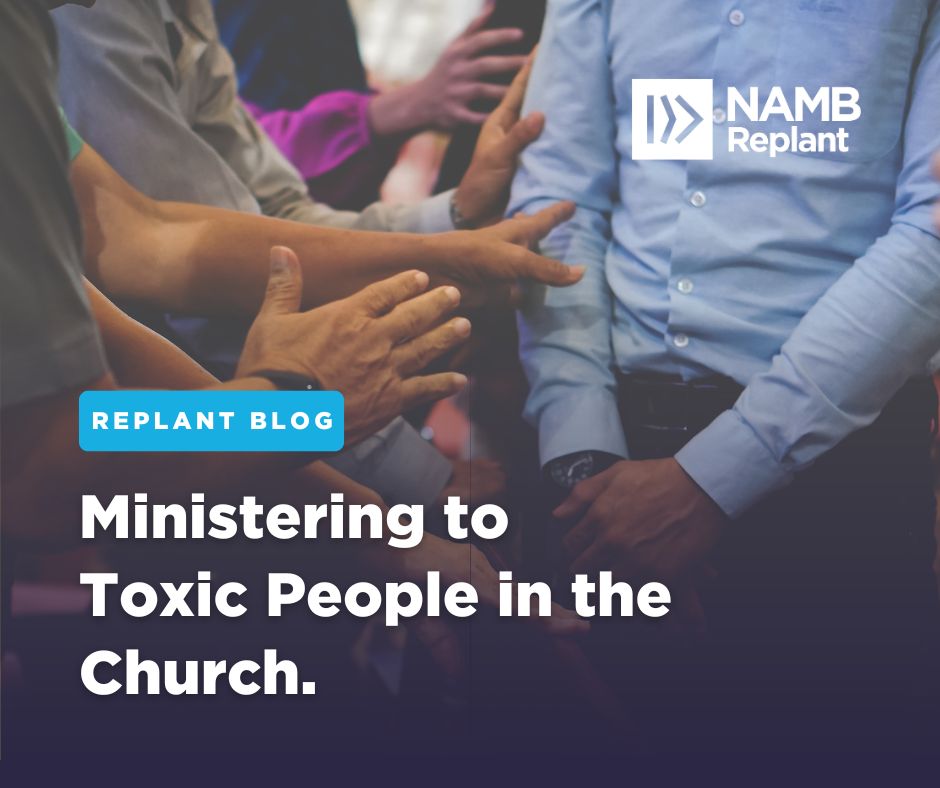By The Replant Team
Every church has them: people who, intentionally or not, make life difficult. Some come with sinfully toxic behaviors, others with personality dysfunctions they may not even recognize. For pastors, this presents a delicate balance: we want to minister lovingly, but we cannot enable harmful behavior. As Proverbs 6:16–19 reminds us, “There are six things the Lord hates… a person who stirs up conflict in the community.” Part of our calling is to lovingly confront and guide, not ignore or excuse, destructive patterns.
So how do we minister to toxic people in our church? Let’s look at four types of people and how we can graciously shepherd them.
THE GOSSIPER
One common type of toxic person is the gossip. This person often seeks the pastor’s attention to share crises, complaints, or confidential information. As Proverbs 20:19 warns, “A gossip betrays a confidence; so avoid anyone who talks too much.” Gossip is not just talk; it erodes trust, sows division, and can subtly manipulate the pastor’s time and emotions. The key is guiding gossips toward prayer and personal responsibility rather than allowing them to dominate pastoral attention. Once you earn trust with them, help them grow in their prayer life. They’re taking the wrong outlet, and we need to redirect that toward the Lord.
THE EXPLODER
Another challenge comes from the exploder—those prone to anger and emotional outbursts. Their volatile nature can intimidate staff, congregation members, and even the pastor. Proverbs 29:22 cautions, “An angry person stirs up conflict, and a hot-tempered person commits many sins.” Pastors must exercise both courage and wisdom here, confronting destructive behavior while maintaining personal safety and pastoral integrity. If you don’t confront the exploder, probably nobody else will. You have the authority of God to address dissension and protect the flock.
THE PASSIVE-AGGRESSIVE
Closely related are the passive-aggressive personalities. Unlike the exploder, their conflict is hidden, simmering beneath the surface. They rarely communicate concerns directly, instead expressing resentment in subtle, often divisive ways. Handling passive-aggressive people requires intentional shepherding: patience, discernment, and frequent check-ins. Romans 12:18 exhorts, “If it is possible, as far as it depends on you, live at peace with everyone.” Pursuing peace with them may feel exhausting, but it’s vital for the health of the congregation and the individual’s spiritual growth.
THE CYNIC
The cynic is another type that can hinder ministry. Cynicism often masquerades as humor or critical thinking, but its underlying effect is discouragement. Cynics focus on why things won’t work, spreading negativity that can sap a church’s vitality. Their influence is particularly harmful when they hold sway over others. Pastors must address cynicism not merely as a personality quirk but as a spiritual concern, helping individuals align their perspectives with God’s promises and the vision He has given the church.
All these behaviors share a common root: a deep need for attention. Some seek it through gossip, others through drama, anger, or passive resistance. Pastors must recognize that their role is not to be the ultimate solution to these individuals’ struggles. Rather, we point them to the only one who can truly transform hearts: Jesus Christ. As 1 Corinthians 2:5 reminds us, “Your faith should not rest on human wisdom, but on God’s power.” Pastoral care is about redirecting dependence from ourselves to God, helping individuals rely on Him rather than exhausting others.
Practical strategies include setting boundaries, redirecting repeated complaints toward prayer, and calling out behaviors in love. Guiding someone to take action before seeking further counsel can be a gentle yet firm way to encourage responsibility and growth. This approach combines pastoral wisdom, biblical truth, and the courage to protect the flock while ministering in grace.
Ministry with toxic personalities is never easy. It requires discernment, patience, and a deep reliance on God. Yet, as we shepherd wisely, confront sin lovingly, and point people to Christ, we create healthier churches and healthier individuals. Every pastoral challenge is an opportunity to demonstrate God’s grace, embody Christlike courage, and cultivate a church where love, peace, and unity flourish.
If you’re navigating these challenges in your church, remember: your role is not to fix people, you are called to guide them to the One who can. Lean on prayer, Scripture, and godly mentorship, and trust that God equips pastors for the demanding, yet profoundly rewarding, work of shepherding His flock.
This blog article comes from a recent episode of the Revitalize & Replant Podcast with Mark Clifton and Mark Hallock. Listen to the episode here: Ministering to Toxic People.
Published October 20, 2025



